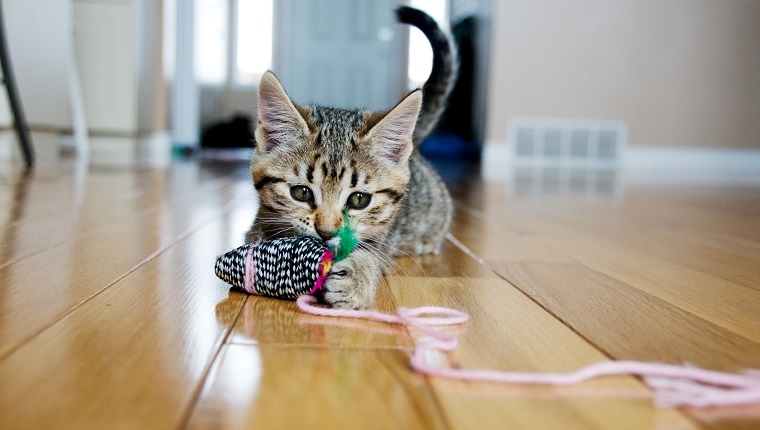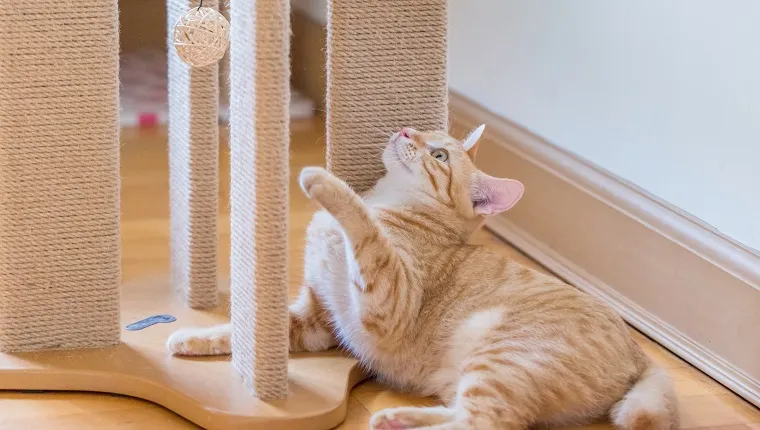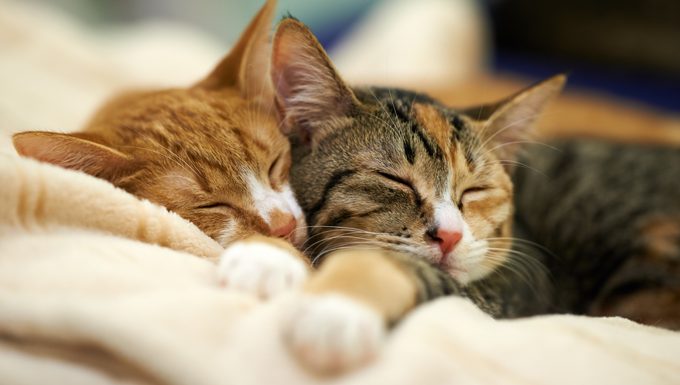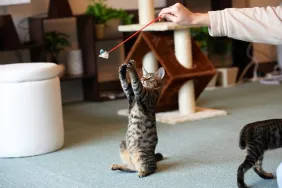One day you have a disarmingly cute kitten; the next, you’re living with a lanky “teenage” cat who’s decided it’s time to make their mark on the world — literally. They’re scratching, marking, yowling, yearning to be free.
All of a sudden, your adorable kitten is really hard to live with. Welcome to feline adolescence.
From approximately six months to 18 months of age, kittens mature into adult cats, a process that is both fascinating and frustrating. Fascinating because it’s always interesting to see a youngster develop, and frustrating because, well, it’s like life with any teenager.
Here are a few things you can expect to see when you live with an adolescent cat — and some things you can do to reduce the stress they might cause you.
Energy, Energy, & More Energy

Your adolescent cat is full of energy that they don’t know what to do with, and they want to find their place in the world — ideally at the top of the heap — by testing boundaries with you and with any other cats in the household.
That might mean scratching on the furniture to leave scent marks identifying the object as their own, urine marking furniture or other objects for the same reason, and picking fights with other cats.
At the very least they’ll be showing off their physical prowess by jumping to the highest points in the room and sometimes clumsily knocking over Great Aunt Jane’s Chinese vases in the process.
Don’t Forget About Spaying Or Neutering

Adolescence is also the time that your kitten reaches sexual maturity. It’s hard to imagine, but your little kitten can be ready to produce kittens of their own or contribute to the kitten-making process when only five months old.
If your female kitten is suddenly screaming and rolling with desire, then she’s just gone into heat, or estrus. This ear-splitting torture, er, phase, usually lasts about a week, during which time you’ll need confine her as securely as if she were in Alcatraz so that no males are able to heed her siren call.
Immediately afterward, you can have her spayed so that neither of you has to experience that again.
To eliminate the chance of your cat going into heat and to reduce unwanted sexual behavior such as urine marking, which can be done by both males and females, have your kitten fixed when he or she is three to four months old.
That might seem early, but it’s an easy surgery at that age. Kittens bounce back quickly, more so than older cats who undergo spay or neuter procedures.
Your female will never again experience the frustrations of an unrequited estrus, and your young male will be less likely to express the belligerent behaviors of swaggering tom cats set on conquering territory.
Channel Their Energy Appropriately

So that you and your kitten both survive their adolescence, channel their energy through puzzle toys, trick training, and daily play times.
If they try to use your body parts as playthings, warn them off with a squirt of water or canned air, or make a hiss noise and walk away, just like their siblings would do.
Make sure they have plenty of interactive toys that will engage their brain and give them opportunities to hunt, stalk and chase. A tall cat tree will give them an outlet for climbing and scratching.
Trick training teaches self-control and can help you redirect some of those behaviors you don’t like, too. Training isn’t just for dogs. Lots of cats enjoy the mental workout of learning tricks, and some cats will even play a game of fetch!
Be patient and keep a tight hold of your sense of humor. This too shall pass, and one day you’ll wake up to find yourself living with a serene, well-behaved adult cat.
Do you have any other tips for handling a cat in their adolescence phase? Is your cat going through their terrible teenager stage right now? Let us know in the comments below!
Click the bold links in the article to shop for your cat and support our content!









